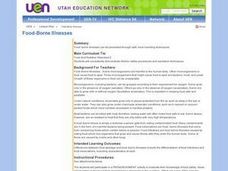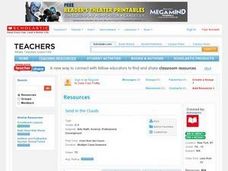Curated OER
Food-Borne Illnesses
Use this lesson to have your charges consider the differences between food spoilage and food-borne illnesses including the differentiation of food infections and food intoxication, including characteristics of each. Some excellent...
Curated OER
Ring of Fire
Students locate some of the 1,500 active volcanoes on a world map. Then by comparing their maps with a map of the world's tectonic plates, they discover that volcanoes occur because of the dynamic nature of the Earth's lithosphere.
Curated OER
Those Baffling Bibliographies!
Are you working on a research and citation unit? Have your young writers listen to a lecture on how to cite research sources correctly and how to distinguish new information that requires citing. They compile a list of works cited from...
Curated OER
Environmentally Friendly
What can your pupils do to promote better conditions for wildlife? After researching issues around wildlife management, class members use the Internet to locate three different organizations devoted to protecting wildlife. They then...
Curated OER
Infection Wars
Students observe blood cells under a microscope and make drawings of their observations. They write and act out a short play starring blood cells, antibodies and bacteria to demonstrate fighting infection.
Curated OER
The Sweet Connection
Students use maps to find what crops are dominant in areas where honey bees are raised and discuss possible correlations. They mark the top ten honey- producing states on a US map.
Curated OER
Energy Sources
Students explore a variety of sources and types of energy. The difference between energy for a person and energy for an automobile are examined. Efficiency and care for the environment are included in this experience.
Curated OER
Conservation in Small Spaces: Conservation
Pupils define conservation, identify actions that conserve habitat and those that reduce habitat, and generate ideas about how one can practice conservation in everyday life.
Curated OER
Send in the Clouds
Students examine the components of the water cycle and follow step by step directions to build a three dimensional cloud. The vocabulary words used in the lesson are attached to the cloud for a lesson review.
Curated OER
Seashell Painting
Let nature inspire your budding artists. They paint seascapes on actual seashells. First, they observe the seaside, then they paint what they see (image or in person) on the inside of a white shell.
Curated OER
Publishing a Newspaper about Biomes
Young journalists create newspapers of individual biomes after researching their biomes. This instructional activity can be completed in three phases and concludes with each person publishing their individual newspaper pages.
Curated OER
Why the Y2Y?
Students investigate the proposed route from Yellowstone to Yukon. They listen to lectures about the proposal and the different opinions concerning it. Students research the type of wildlife in the area for the road and they consider how...
Curated OER
There's a Volcano in my Backyard!
Students utilizing a volcanic hazard map of Mount Rainier, reach conclusions about the potential hazards of future eruptions. They create educational materials about these hazards and what to do if one erupts again in the future.
Curated OER
Vote on Disposal Options for Hazardous Household Products
In this health worksheet, students realize that hazardous household products present special disposal challenges. Students view 11 images on an overhead projector and vote (thumbs up, thumbs down) on whether the disposal option is a good...
US Energy Information Administration
Primary Activity: Energy and Machines
Conservation kids take this printable home, draw a picture of their bedrooms, then cut out and paste pictures into the drawing to show what energy-using appliances are present. This assignment is a very practical way to wrap up a unit on...
Curated OER
Starfish Challenge
In this starfish activity worksheet, students respond to 10 multiple choice questions that require them to exhibit the knowledge they have regarding starfish.
Curated OER
Starfish Vocabulary
In this starfish vocabulary skills worksheet, learners match the 10 starfish-related terms in the word bank to the appropriate definitions.
Curated OER
Starfish Crossword
In this starfish crossword puzzle worksheet, students use the 10 clues and the terms in the word bank to help them correctly complete the word puzzle.
Alabama Learning Exchange
Nature's Life Cycle
Become a member of the Pollution Patrol and stand up to litter! After discussing the life cycle of seeds and discussing how plants figure into the food chain, young conservationists engage in several activities involving podcasts,...
University of Wisconsin
Planting a School Rain Garden
Finally, the day has arrived for introducing plants into the rain garden. If you have been following the entire unit, this will serve as a helpful guide for planting day. If you have not been using the previous lessons in this unit with...
ARKive
Butterflies and Blooms
The Northwoods of Wisconsin are lovely in the summer,and they are also home to many flower and butterfly species. Investigate the ways in which seasonal flowers and butterflies are interdependent on each other for survival with a fun...
Michigan State University
Interviewing
Do you have pests at your school? Find out through a series of interviews with school personnel. Scholars visit a variety of knowledgable individuals to ask them questions, record their answers, and present their findings to their peers.
Project Noah
Writing Goes Wild
Young scientists develop their observation and writing skills as they craft and then post a detailed description of a plant or animal they have spotted and photographed.
Other popular searches
- 4th Grade Science Project
- Physical Science Projects
- Science Project on Pulleys
- Science Project Volcano
- Science Project Gravity
- Science Project Ideas
- Forensic Science Project
- Science Fair Project Ideas
- Rock Science Project
- Science Project Food
- Science Project Terrarium
- Science Fair Project Data

























